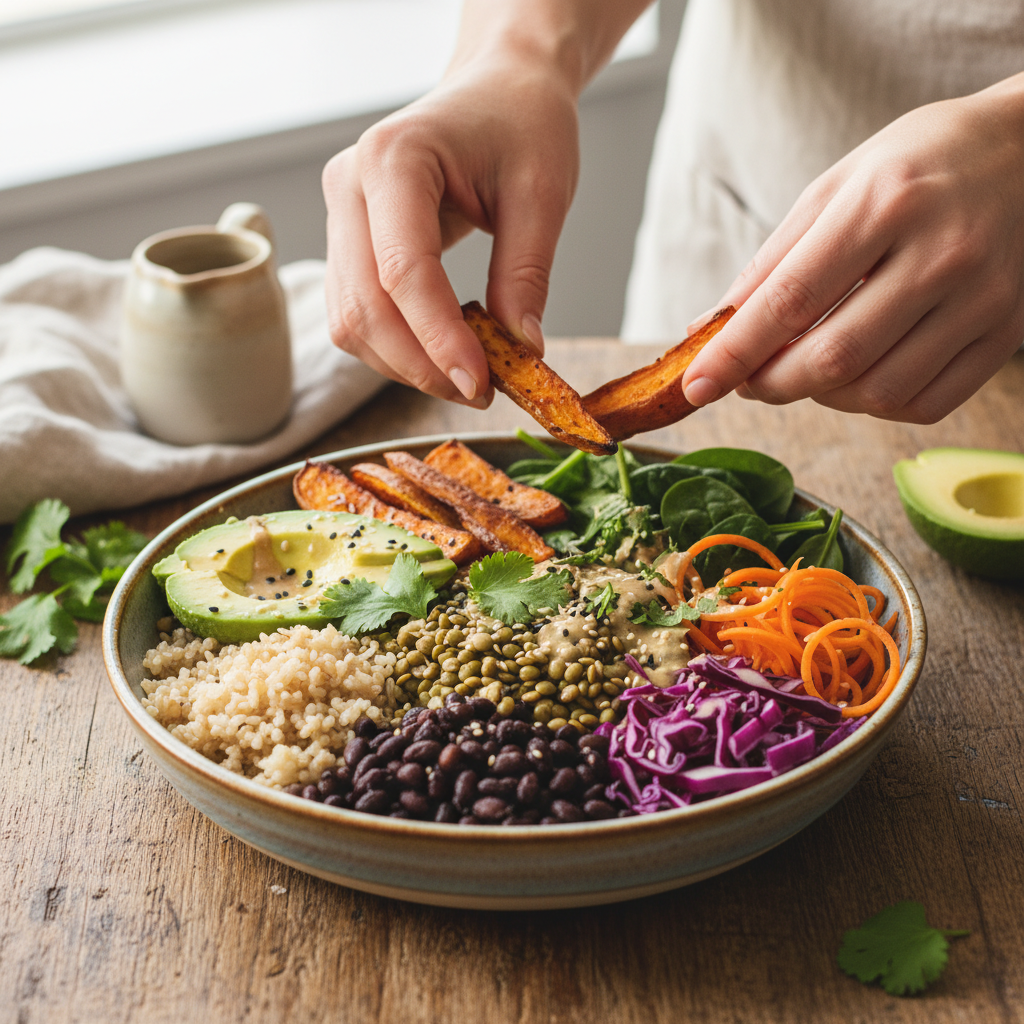
Table of Contents
Introduction
Something interesting is happening in kitchens around the world. More people are looking at their plates and asking: “What if there’s a better way to eat?” Plant-based diets aren’t just trendy anymore—they’re becoming a genuine lifestyle shift. And honestly? It makes sense. Whether you’re worried about your health, care about the planet, or simply feel better when you eat more plants, this way of eating is catching on for good reasons.
Here’s what’s fascinating about plant-based eating: it’s not just about removing things from your diet. It’s about discovering an incredible variety of foods you might never have tried before. Think colorful vegetables, hearty grains, protein-packed legumes, and nuts that actually make you feel satisfied. The research backing this up is pretty compelling too. Health experts keep finding connections between plant-based diets and lower risks of heart disease, diabetes, and certain cancers. Plus, the fiber, vitamins, and antioxidants in these foods? They’re like fuel for your immune system.
But here’s where it gets really interesting—plant-based eating doesn’t exist in a vacuum. Your diet works hand-in-hand with other aspects of your health. When you’re stressed out, even the best nutrition won’t work as well as it could. That’s why effective stress reduction methods are so important—they help your body actually use those nutrients properly. Same goes for sleep. If you’re not getting quality rest, your body can’t absorb and process nutrients effectively. Learning about healthy sleep habits becomes part of the whole picture. And when you want to make plant-based eating practical? Vegan meal prep recipes can be a game-changer—making nutritious meals convenient instead of complicated.
Let’s be real about something else: this isn’t just about you feeling better (though that’s pretty important). When you shift toward plant-based foods, you’re also making a choice that’s easier on the planet. Less water usage, lower carbon emissions, fewer resources needed overall. It’s one of those rare win-win situations where what’s good for you happens to be good for everyone else too. And when you understand the science behind nutrients like fiber and antioxidants—how they actually work in your body—making these choices becomes less about following rules and more about understanding why they matter.
What You’ll Learn in This Guide
We’re going to walk through everything you need to know about plant-based eating—whether you’re completely new to this or looking to fine-tune what you’re already doing. Here’s what we’ll cover:
- Health Benefits: How plant-based foods actually work in your body to improve digestion, support your heart, and give you sustained energy. We’ll break down the nutritional science in ways that actually make sense for everyday life.
- Nutritional Advantages: The specific nutrients you’ll be getting more of—fiber that keeps you satisfied, vitamins that boost your energy, antioxidants that fight inflammation, and yes, even omega-3s from plant sources.
- Disease Prevention: The real research on how plant-based eating can lower your risk of chronic diseases. We’ll talk about inflammation, cholesterol, and other factors that matter for long-term health.
- Weight Management: How this way of eating affects your metabolism, why plant foods help you feel full, and what this means for maintaining a healthy weight naturally.
Coming up, we’ll also tackle the practical stuff—like how to actually make this transition without feeling overwhelmed. Meal planning that works for real life, dealing with common challenges (yes, people will ask about protein), and making this sustainable for the long haul. Because here’s the thing: this isn’t just about changing your diet. It’s about creating a lifestyle that feels good and does good.
You’ll walk away from this guide with confidence in your food choices and a clear understanding of how to make plant-based eating work for your specific situation. We’ve gathered insights from nutrition experts, but we’re presenting them in a way that’s actually useful for your daily life. Whether you’re motivated by health improvements, environmental concerns, or both, you’ll have the tools to move forward in a way that makes sense for you.
In the sections ahead, we’ll get into the specifics of disease prevention and environmental impact. You’ll find practical recipes and lifestyle strategies that make this whole thing more manageable—and actually enjoyable. And since we know that good health is about more than just food, we’ll touch on how stress management and other lifestyle factors fit into the bigger picture of feeling your best.

We’ve already talked about how plant-based diets are having a moment right now. But here’s where things get really interesting—the benefits go way beyond what’s on your plate. Sure, there are incredible health perks (and we’re talking life-changing stuff here), but the ripple effects touch everything from our planet’s future to the practical realities of making this shift work in your daily life. Think of it this way: when you choose plants over animal products, you’re not just feeding yourself better—you’re participating in something much bigger. And yes, there are challenges along the way, but that’s exactly why we’re here to walk through this together.
Health Benefits of a Plant-Based Diet
Let’s be honest—when people first hear about plant-based eating, the health benefits are usually what grabs their attention. And for good reason. We’re talking about a way of eating that’s like giving your body a daily dose of premium fuel. Think vegetables, fruits, legumes, nuts, and grains—the kind of whole foods that come packed with vitamins, minerals, fiber, and antioxidants. These aren’t just fancy nutrition buzzwords, either. They’re the real deal when it comes to fighting inflammation, keeping your digestive system happy, and building up your immune defenses. Want to dive deeper into one of the real game-changers here? Check out our guide on the importance of dietary fiber for your health—it breaks down exactly how fiber works its magic on your digestive system and metabolism.
But here’s what really gets exciting: these aren’t just “feel good today” benefits. Plant-based eating has serious long-term disease-fighting power. The research is pretty compelling—we’re looking at lower risks for heart disease, type 2 diabetes, high blood pressure, and even certain cancers. How does it work? Your blood sugar stays more stable, your cholesterol profile improves, and your blood pressure tends to normalize. It’s like your body finally gets to work the way it’s supposed to. And here’s something you might not have considered: managing stress plays a huge role in how well your body uses all these great nutrients. That’s why pairing good nutrition with smart stress management (like the strategies in effective stress reduction methods) creates this powerful one-two punch for your overall health.
Key Aspects of Health Benefits
Let’s break down exactly what makes plant-based eating such a health powerhouse. When you understand these pieces, you can make smarter choices about what goes on your plate.
- Nutrient Density and Antioxidants: Plants are basically nature’s multivitamin—loaded with vitamins A, C, E, magnesium, and those protective compounds called phytochemicals. These antioxidants fight off the cellular damage that leads to aging and disease. It’s like having a microscopic army defending your health 24/7.
- Fiber Content and Digestive Health: Here’s where things get interesting for your gut. All that fiber keeps things moving smoothly (if you know what I mean), feeds the good bacteria in your digestive system, and helps you feel full without overeating. Your gut health affects everything from your mood to your immune system.
- Disease Prevention and Heart Health: When you cut back on saturated fats from animal products and load up on heart-healthy plant nutrients, your cardiovascular system gets a major upgrade. Lower cholesterol, better blood pressure, reduced inflammation—your heart will thank you.
- Weight Management and Metabolic Benefits: Plant foods tend to be naturally lower in calories but higher in satisfaction. Translation? You can eat until you’re full without the calorie overload. Plus, your metabolism runs more efficiently, and your body gets better at managing insulin. Win-win-win.
Now that you’ve got the health picture, let’s talk about something equally important—how your food choices affect the world around you. Because the environmental benefits? They’re pretty mind-blowing.
Environmental Benefits of Adopting a Plant-Based Diet
Okay, so we’ve covered what plant-based eating does for your body. But here’s something that might surprise you: what you eat has a massive impact on the planet. Food production—especially animal agriculture—is one of the biggest drivers of environmental problems we’re facing today. When you shift toward plant-based meals, you’re essentially voting for a healthier planet with every bite. Curious about the bigger picture of sustainable food systems? Take a look at this guide on sustainable agriculture techniques—it shows you exactly how farming practices can either harm or heal our environment.
The carbon footprint difference alone is staggering. Growing plants for food uses way less energy, land, and water compared to raising animals for meat and dairy. We’re talking about a significant reduction in greenhouse gases, plus you’re supporting biodiversity and soil health. When more people make this shift, it adds up to real progress on climate change and resource conservation. And if you want to amplify your environmental impact even more, combining plant-based eating with other eco-friendly practices (like the ones outlined in how to reduce greenhouse gas emissions) creates a powerful environmental strategy.
Key Aspects of Environmental Benefits
Let’s get specific about how choosing plants over animal products makes a real difference for our planet’s future.
- Lower Greenhouse Gas Emissions: Animal agriculture pumps out methane and nitrous oxide—greenhouse gases that are way more potent than CO2. When you choose plant foods, you’re dramatically cutting your contribution to these atmospheric pollutants. It’s climate action you can take three times a day.
- Conservation of Water Resources: Here’s a fact that might shock you: it takes thousands of gallons of water to produce a pound of beef, but only a fraction of that for plant proteins. In a world where water scarcity is becoming a real issue, every plant-based meal helps preserve this precious resource.
- Reduced Land Use: Livestock farming eats up enormous amounts of land—both for grazing and growing feed crops. This often means cutting down forests and destroying natural habitats. Plant-based diets need way less land, which means more space for wildlife and ecosystems to thrive.
- Promotion of Biodiversity: Sustainable plant farming can actually support diverse ecosystems instead of destroying them. When done right, it maintains healthy soil, supports various plant and animal species, and creates the kind of environmental resilience we desperately need.

Going plant-based isn’t just about what’s on your plate—it’s about transforming your entire relationship with food. When you focus on nutrient-packed whole foods like vegetables, fruits, legumes, and grains, something amazing happens. Your body gets flooded with all the good stuff: fiber, antioxidants, vitamins, and minerals that actually work for you. We’re talking better digestion, a stronger immune system, and less inflammation throughout your body. And here’s what the research keeps showing us—people who eat this way have lower rates of heart disease, type 2 diabetes, and certain cancers. Your cholesterol levels improve, blood sugar stays more stable, and blood pressure often drops into healthier ranges. Plus (and this is a big plus), all that fiber keeps you feeling satisfied while naturally helping you maintain a healthy weight. Your metabolism just runs more efficiently.
But wait—there’s more to this story than just personal health. Every time you choose plants over animal products, you’re basically giving the planet a high-five. Think about it: producing plant foods creates way fewer greenhouse gas emissions than raising livestock. Your carbon footprint shrinks without you having to change anything else about your lifestyle. And the resource savings? Mind-blowing. We’re talking about dramatically less water and land use, which means more space for wildlife and healthier ecosystems all around. Now, I won’t sugarcoat it—making this transition does come with some challenges. You’ll need to think about nutrients like B12 and omega-3s, and social situations can get a bit tricky at first. But here’s the thing: these hurdles are totally manageable once you know what you’re doing. The connection between what we eat and the health of our planet isn’t just some abstract concept—it’s real, and it’s happening right now.
Ready to take the plunge? The key is starting small and keeping things simple. Swap out one meal at a time, experiment with recipes that actually taste good, and don’t put pressure on yourself to be perfect overnight. If you want to make meal planning a breeze, check out our guide on vegan meal prep recipes—it’s packed with ideas that’ll keep your taste buds happy and your week organized. And speaking of organization, mastering time management skills can be a game-changer when it comes to meal prep and reducing the stress of eating well. Since we’re talking about stress, learning some solid stress reduction methods actually helps your body absorb nutrients better (cool, right?). If you’re curious about the bigger picture of where your food comes from, diving into sustainable agriculture techniques will blow your mind about how farming practices can either help or hurt our environment.
Here’s what it comes down to: choosing plant-based eating means you’re taking care of yourself while taking care of the planet. It’s not about being perfect or following some impossible standard. It’s about making choices that feel good in your body and align with your values. The resources we’ve shared here? They’re your toolkit for making this transition smooth and enjoyable. Give yourself permission to go at your own pace, celebrate the small wins, and remember that every plant-based meal matters. Your health will thank you, your energy levels will soar, and you’ll sleep better knowing you’re part of the solution. That’s what I call a win-win-win.
Frequently Asked Questions
-
What are the main benefits of a plant-based diet?
- Plant-based diets improve health by providing essential nutrients, help prevent chronic diseases, support weight management, and promote environmental sustainability.
-
Is a plant-based diet suitable for everyone?
- Generally yes, though individuals should consider their unique health conditions and consult healthcare professionals to tailor the diet appropriately.
-
How do I get enough protein on a plant-based diet?
- By including diverse sources like legumes, nuts, seeds, and whole grains, you can meet your protein needs effectively on a plant-based diet.
-
Can a plant-based diet help with weight loss?
- Yes, the high fiber content and lower calorie density of plant foods promote satiety and support healthy weight loss.
-
What are some easy plant-based meals to start with?
- Simple meals like stir-fries, salads, smoothies, and grain bowls are excellent starting points for plant-based eating.
